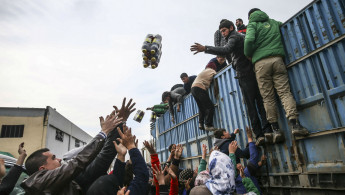Syria: UN-backed task force seeks access to besieged areas
A UN-backed task force met yesterday to discuss delivering aid to besieged and hard to reach parts of Syria.
The group agreed that, "to accelerate the urgent delivery of humanitarian aid, sustained delivery of assistance shall begin this week" in seven besieged areas inside Syria.
They include the town of Madaya, which drew worldwide attention recently after UN and Red Cross relief workers reported people starving to death or being killed trying to flee.
The meeting took place after diplomats gathered in Munich as part of the International Syria Support Group (ISSG) agreed to work with Syrian parties to end hostilities in Syria and establish a humanitarian task force.
The ISSG is made up of the Arab League, the European Union, the United Nations and 17 countries including the US and Russia.
The purpose of the meeting was to agree on how the task force and its members could ensure that immediate access is granted to the civilian populations in besieged and hard to reach areas in line with the agreement reached by the ISSG in Munich.
"The UN system has been geared to deliver this aid all along, especially to besieged areas, and that's precisely what's going to be discussed today: how to start, and when to start," said Ahmed Fawzi, interim director of the UN Information Service in Geneva, before the meeting.
"We hope to start as early as tomorrow, immediately after the meeting, decisions will be taken to roll the aid in, especially to besieged areas that need it."
A statement issued by a spokesperson for Steffan de Mistura, the UN Special Envoy for Syria, after the meeting said that assistance to besieged areas is expected to start this week.
"Once we get clearance by concerned parties, the UN and its humanitarian partners will be able to reach the civilians in need within the coming days," said de Mistura.
 |
Once they get clearance from the concerned parties, the UN and its humanitarian partners will be able to reach the civilians in need within the coming days. |
 |
"Next week, we plan to have a second meeting of this task force, in order to assess the progress made, and maintain the pressure for incremental and unimpeded aid deliveries," he explained.
Separately, Stephen O'Brien, the UN Under-Secretary-General for Humanitarian Affairs and Emergency Relief Coordinator, welcomed the news that the members of the ISSG agreed to a cessation of hostilities in Syria.
He urged the parties to the conflict to ensure full, sustained and unimpeded humanitarian access, including to besieged and hard-to-reach areas, in accordance with their obligations under international humanitarian law.
"The people of Syria – in Aleppo, Madaya, Foah and Kefraya, Deir ez-Zor and elsewhere – need an end to the brutal violence and bombing, the sieges, denial of free movement, food and medical care," he said.
O'Brien also emphasised that the United Nations and its partners need safe, sustained access for humanitarian workers throughout the country.
He went on to stress that the UN remains committed and ready to deliver aid and protection for civilians in desperate need, whoever and wherever they are.
"Above all we need to see meaningful action on the ground, so that Syrians and their neighbours can start to rebuild their lives and their country," he concluded.





 Follow the Middle East's top stories in English at The New Arab on Google News
Follow the Middle East's top stories in English at The New Arab on Google News
![The UAE is widely suspected of arming the RSF militia [Getty]](/sites/default/files/styles/image_330x185/public/2024-11/GettyImages-472529908.jpg?h=69f2b9d0&itok=Yauw3YTG)
![Netanyahu furiously denounced the ICC [Getty]](/sites/default/files/styles/image_330x185/public/2024-11/GettyImages-2169352575.jpg?h=199d8c1f&itok=-vRiruf5)
![Both Hamas and the Palestinian Authority welcomed the ICC arrest warrants [Getty]](/sites/default/files/styles/image_330x185/public/2024-11/GettyImages-2178351173.jpg?h=199d8c1f&itok=TV858iVg)